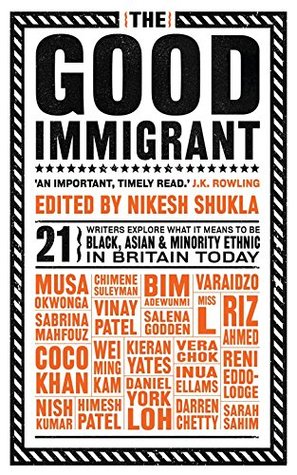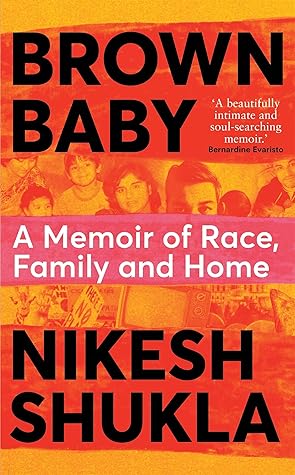Non-Fiction November
I've found myself reading mainly non-fiction this month, and after seeing someone post on IG about "Non-Fiction November", I've decided to make it a thing. So here are my top 10 non-fiction recommendations:

Invisible Women: Data Bias in a World Designed for Men by Caroline Criado Pérez shows us how, in a world largely built for and by men, we are systematically ignoring half the population. It exposes the gender data gap – a gap in our knowledge that is at the root of perpetual, systemic discrimination against women, and that has created a pervasive but invisible bias with a profound effect on women’s lives.

Revolting Prostitutes: The Fight for Sex Workers’ Rights by Molly Smith and Juno Mac asks a question you don't hear very often: What do sex workers want? In this accessible manifesto, the strong argument for full decriminalization of sex work is explored through personal experience and looking at laws around the world.

The Good Immigrant edited by Nikesh Shukla brings together 21 black, Asian and minority ethnic voices emerging in Britain today, to explore why immigrants come to the UK, why they stay and what it means to be ‘other’ in a country that doesn’t seem to want you, doesn’t truly accept you – however many generations you’ve been here – but still needs you for its diversity monitoring forms.

Seven Brief Lessons on Physics by Carlo Rovelli guides us, with simplicity and clarity, through the scientific revolution that shook physics in the twentieth century and still continues to shake us today. This book offers everything you need to know about modern physics, the universe and our place in the world in seven enlightening lessons.

The Five: The Untold Lives of the Women Killed by Jack the Ripper by Hallie Rubenhold is a passionate condemnation of the misogyny Jack the Ripper's victims have been held in for over a century. The Five tells an engrossing group biography of Victorian womanhood, blighted by poverty and powerless against casual and constant abuse.

Jews Don’t Count by David Baddiel is a book about how identity politics failed one particular identity. Baddiel outlines why and how, in a time of intensely heightened awareness of minorities, Jews don’t count as a real minority: and why they should.

African Europeans: An Untold History by Olivette Otélé uncovers the long history of Europeans of African descent, tracing an old and diverse African heritage in Europe through the lives of individuals both ordinary and extraordinary. By exploring a history that has been long overlooked, Otélé sheds light on questions very much alive today-on racism, identity, citizenship, power and resilience.

Afropean: Notes from Black Europe by Johny Pitts is an on-the-ground documentary of areas where Europeans of African descent are juggling their multiple allegiances and forging new identities. Here is an alternative map of the continent, inhabiting European communities that fly under the radar of the mainstream media.

Women & Power: A Manifesto by Mary Beard explores the cultural underpinnings of misogyny, considering the public voice of women, our cultural assumptions about women's relationship with power, and how powerful women resist being packaged into a male template.

Brown Baby: A Memoir of Race, Family and Home by Nikesh Shukla explores themes of racism, feminism, parenting and our shifting ideas of home. Through love, grief, food and fatherhood, Shukla shows how it’s possible to believe in hope.
I'd love to hear your non-fiction recommendations, via Goodreads, Twitter, or Instagram!

Invisible Women: Data Bias in a World Designed for Men by Caroline Criado Pérez shows us how, in a world largely built for and by men, we are systematically ignoring half the population. It exposes the gender data gap – a gap in our knowledge that is at the root of perpetual, systemic discrimination against women, and that has created a pervasive but invisible bias with a profound effect on women’s lives.

Revolting Prostitutes: The Fight for Sex Workers’ Rights by Molly Smith and Juno Mac asks a question you don't hear very often: What do sex workers want? In this accessible manifesto, the strong argument for full decriminalization of sex work is explored through personal experience and looking at laws around the world.

The Good Immigrant edited by Nikesh Shukla brings together 21 black, Asian and minority ethnic voices emerging in Britain today, to explore why immigrants come to the UK, why they stay and what it means to be ‘other’ in a country that doesn’t seem to want you, doesn’t truly accept you – however many generations you’ve been here – but still needs you for its diversity monitoring forms.

Seven Brief Lessons on Physics by Carlo Rovelli guides us, with simplicity and clarity, through the scientific revolution that shook physics in the twentieth century and still continues to shake us today. This book offers everything you need to know about modern physics, the universe and our place in the world in seven enlightening lessons.

The Five: The Untold Lives of the Women Killed by Jack the Ripper by Hallie Rubenhold is a passionate condemnation of the misogyny Jack the Ripper's victims have been held in for over a century. The Five tells an engrossing group biography of Victorian womanhood, blighted by poverty and powerless against casual and constant abuse.

Jews Don’t Count by David Baddiel is a book about how identity politics failed one particular identity. Baddiel outlines why and how, in a time of intensely heightened awareness of minorities, Jews don’t count as a real minority: and why they should.

African Europeans: An Untold History by Olivette Otélé uncovers the long history of Europeans of African descent, tracing an old and diverse African heritage in Europe through the lives of individuals both ordinary and extraordinary. By exploring a history that has been long overlooked, Otélé sheds light on questions very much alive today-on racism, identity, citizenship, power and resilience.

Afropean: Notes from Black Europe by Johny Pitts is an on-the-ground documentary of areas where Europeans of African descent are juggling their multiple allegiances and forging new identities. Here is an alternative map of the continent, inhabiting European communities that fly under the radar of the mainstream media.

Women & Power: A Manifesto by Mary Beard explores the cultural underpinnings of misogyny, considering the public voice of women, our cultural assumptions about women's relationship with power, and how powerful women resist being packaged into a male template.

Brown Baby: A Memoir of Race, Family and Home by Nikesh Shukla explores themes of racism, feminism, parenting and our shifting ideas of home. Through love, grief, food and fatherhood, Shukla shows how it’s possible to believe in hope.
I'd love to hear your non-fiction recommendations, via Goodreads, Twitter, or Instagram!
Published on November 15, 2021 13:13
No comments have been added yet.



